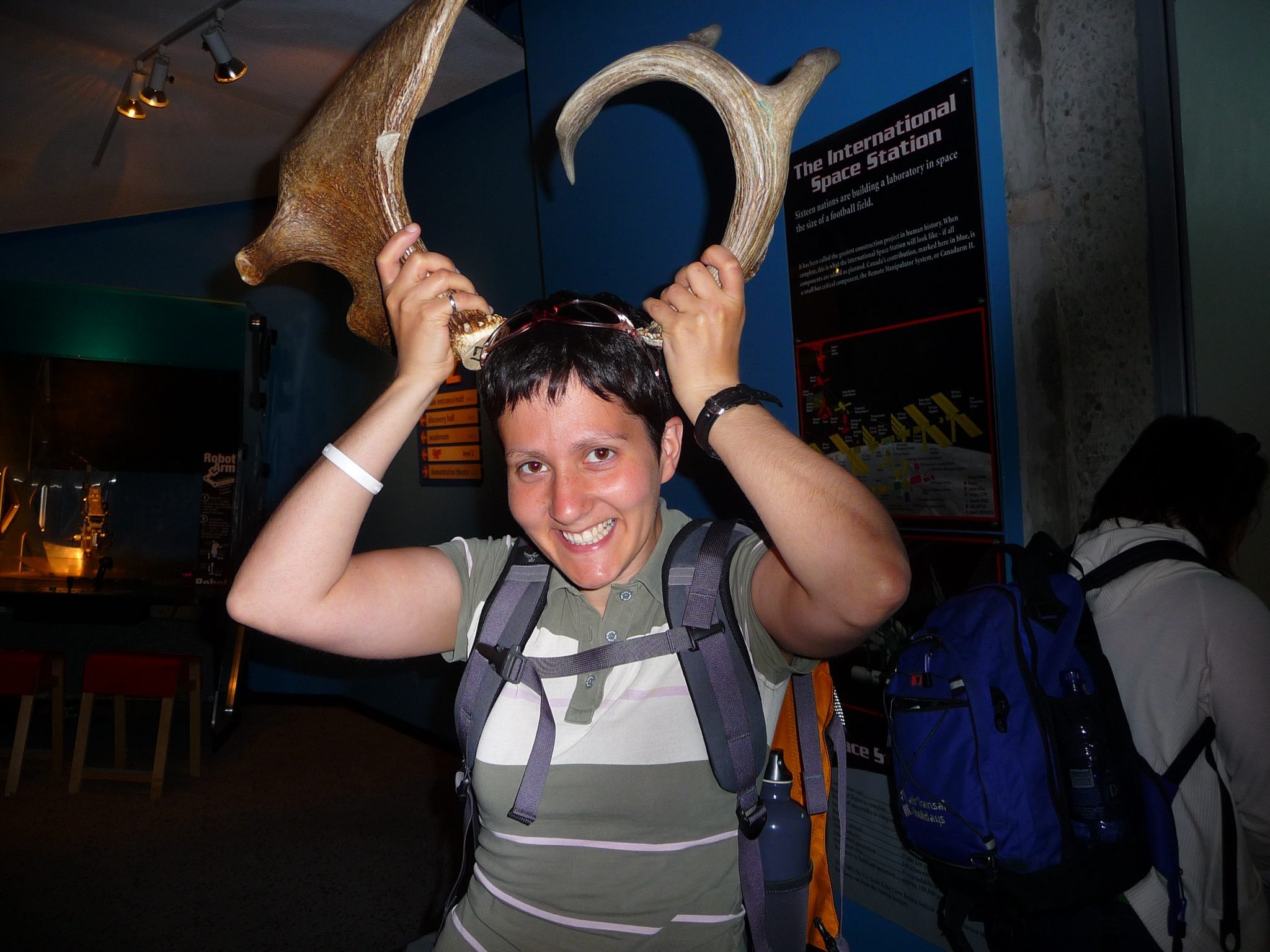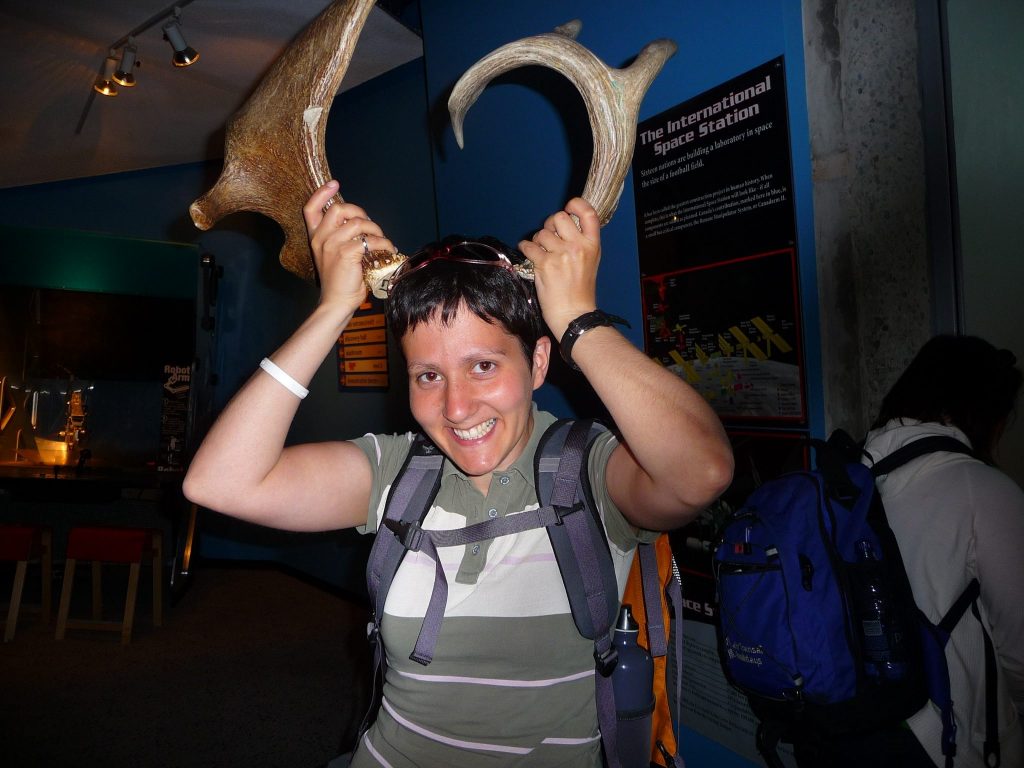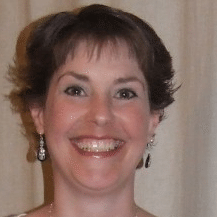
Victoria David (Updated)
Victoria’s profile was updated in December 2015. Click here to read the update!
Hometown: Montreal, Quebec
What school do you attend? McGill University and University of Oxford
Do you work? No. Currently a student
What is your career goal? Water Policy Advisor
How did you find out you were sick? What event(s) led to the diagnosis?
I found a lump in my right breast and didn’t really think much of it. A few weeks later, I had a doctor’s appointment for something completely unrelated but decided to mention it. My GP referred me for a biopsy but insisted that given my age it was probably nothing. The biopsy was scheduled for two months later. “Nothing” turned out to be cancer.
What year was it? What was your age at the time?
I was 27 at the time.
At what level of education were you at diagnosis?
Graduate Student (master’s). I had to suspend my degree as I was studying in the UK. I returned to Canada for treatment. I am currently back in the UK finishing up my degree.
What was your diagnosis?
Stage 2 breast cancer
What were your first thoughts when diagnosed?
Complete shock and disbelief. I went in for a biopsy and it didn’t even cross my mind that it could be cancer. When they told me I had cancer, I said something along the lines of “that’s impossible.” I lived in the land of denial for the first few days.
How did your friends react? Were you treated any different?
My friends were shocked but they also were rockstars. They went out of their way to help me out and were incredibly supportive. Overall, I don’t believe I wasn’t treated any differently. I think the beginning was the toughest for my friends because they felt helpless while I waited for more information on the cancer and treatment. I actually had many friends visit me in Montreal while I underwent treatment – it was a welcome distraction.
What did your treatment consist of?
Medical Side:
My treatment started out with surgery (lumpectomy and axial node dissection). It was followed up with six rounds of chemotherapy (TC – taxotere and cyclophosphamide) and 29 radiotherapy sessions. My goal was not to spend a single night in the hospital (mission accomplished).
Surgery was an outpatient procedure, in at 7 a.m., out by 1 p.m. Ironically, the surgery was scheduled the same day as one of my final exams. I had been dreading that day (because of exams) for a while, but now I was dreading it for far different reasons (and with this new perspective, much scarier reasons). I recovered quite quickly from surgery, and they let me leave within two hours of completing the procedure. The main side effects from surgery were regaining mobility in my arm. They had to cut through muscle and nerve to remove the axial lymphnodes. It took about eight weeks to regain full mobility. At first I was concerned the physio would tear out my stitches, but once I realized they weren’t coming out, physio progressed quite well.
Chemotherapy went surprisingly well. I had six rounds over 18 weeks. I think the three weeks off between each round really helped. I had chemo on Thursdays, so the first weekend after was always a write off. I usually felt tired and nauseous. By Monday I would start recovering and by Wednesday (day seven) I would feel 80 per cent. That would leave me two weeks off before the next round. I would take these two weeks to go running and cycling.
The final part of my treatment was radiotherapy. I had 29 sessions over six weeks. They usually lasted five minutes, but I would spend about 30-60 minutes in the hospital. The side effects from the radiation were minimal and my skin took it like a champion.
I underwent trastuzumab treatment in 2009-2010 (after some conflicting pathology reports). My UK pathology report had my biopsy sample as HER2 positive while my Canadian pathology reported the tumor as HER2 negative. After some discussion, it was felt I would benefit from trastuzumab. The main challenge was the impact on my heart’s ejection fraction. It dropped towards the lower limit of normal (my baseline was the upper limit of normal) and my oncologist advised on limiting physical activity for the remainder of treatment. This was quite frustrating as I am a fairly active person. Once I completed treatment, I started exercise again, but it was clear my fitness had declined significantly.
I also had fertility treatment. Since my tumor was estrogen positive, I could not get invitro-fertilization (IVF) as you need to take estrogen. I had a procedure called invitro-maturation (IVM) when they mature the egg outside the ovary (no estrogen necessary). I did have to take an injection of human chorionic gonadotropin (hcg) (a pregnancy hormone). The actual procedure took one hour (under full anesthesia). The procedure is not covered by health care, but since I was a student, a cancer fund through the McGill Reproductive Centre covered the costs. I had the procedure done two weeks after surgery before chemo treatment.
Non-medical side:
The hardest part emotionally was the beginning, the unknown. Once the doctors gave me a plan of attack, I knew what I had to do and I felt in control again. I went to the young adult cancer support groups through the Royal Victoria Hospital. I did a lot of running and cycling. I think the running is what got me through chemo. It felt like I was reclaiming my body.
In which hospitals were you treated?
Montreal General Hospital (radiotherapy), Royal Victoria Hospital (surgery, chemo, fertility)
What is your current medical status?
Healthy!
How is life different for you now post diagnosis (physically, emotionally, socially, spiritually)?
Emotionally/Socially:
My primary life goal now is to have fun. I used to be an overachiever, but now, I focus on having fun and just achieving. For instance, last year when I was in the UK for school, I would study every weekend. This year, I’ve been hiking in the Lake District, snowboarding in the Italian Alps, and biking from Belgium to Netherlands. My grades might suffer, but I have way more fun, better pictures, and better stories.
Physically:
I used to be quite active. I was training for a triathlon prior to being diagnosed, and I will actually be competing in my first triathlon next month in London. So not much has changed on that front.
What was the toughest part of your challenge?
The uncertainty. There is a ton of support for the physical treatment, but a significant gap for the emotional support. The diagnosis of cancer shifted me into a world where your future is so uncertain – something that is incredibly scary.
What was the best part about having your challenge?
A new appreciation for life.
What really motivated you to keep going while you were sick?
Running. I think it was my way of saying “screw you” to cancer. I would run five kilometres at least two to three times a week during the second and third weeks following chemo. I ran a 5k towards the end of chemo to raise money for breast cancer. Part of me felt that cancer had taken control of my body and running during treatment was taking back control of my body.
What lessons or messages have you taken away from your experience?
Have fun and follow your dreams now, because you never know what may happen.
What are your thoughts and feelings about your illness now? How have they changed since before your diagnosis?
I was terrified of treatment and I really thought chemo was going to destroy me. But in the end, the treatment wasn’t that bad. I spent a majority of chemo feeling above 80 per cent. It was nice since it was the first time in a long time where I had down time. I have learned many lessons from my illness. Honestly, if I had the choice, I would prefer not to have gone through it. But seeing as that isn’t an option, I try to find the positives in it. What doesn’t kill you makes you stronger. And I truly believe that. I am a better person than I was before.
What are some (if there are any you know of) preventative measures that people can take to lower their risk of having an experience like yours?
Be aware of your body. Don’t discount potential illnesses because of your age. Get things checked out with your doctor.
Did you attend any support groups during your challenge?
Yes. I attended the Young Adults Group at the Royal Victoria Hospital.
Did you find it helped?
I found it was nice to meet other people my age going through it. I connected with some. However, I also met some that would try to give me medical advice. I found this frustrating.
How are you connected with Young Adult Cancer Canada?
Karine used to co-facilitate the young adult support group at the Royal Victoria Hospital. She now works for YACC.
I think it’s a great organization. I think there are so many young adults across Canada, and YACC is a great medium to help them connect.
Profile Update
Age at diagnosis: 27
How long has it been since your last treatment?
Approximately five years.
How are you today? How have you changed since your last update?
I have been out of treatment for several years and aside from an annual visit to my oncologist, my days as a patient are far behind me. That being said, I do spend the majority of my time in hospitals – but for far different reasons. I now work on the health care side. Let me explain.
Since my diagnosis, I have been involved with different organizations to help young adult cancer patients. After completing treatment, I moved to Calgary and worked as a water policy advisor. It became clear that I wanted to do more to help patients. and at the same time, my career as a policy advisor was not nearly as meaningful. So, in 2013, I entered medical school.
Physically, I am in fairly good shape. Physical fitness has always been a priority (both before and after my diagnosis). In my last YACC update, I had written that “My next ridiculous goal” would be doing “A half Ironman.” Well, I am happy to report that in 2012, this ridiculous goal became fact. I also spend a lot of time hiking, skiing, and cycling in the Rocky Mountains – a great perk of living in Calgary. I don’t find I have many physical long-term effects from the cancer treatment; I do believe I am quite lucky on that front.
Perhaps one of the hardest things I had to tackle after completing treatment was fear of recurrence. I found that time was the biggest help on that front. That being said, I still get scanxiety with my annual mammogram. However, in the early years, I would be worried weeks leading up to the scan, while now I tend to only start worrying the night before the scan.
What are you doing today? (school, work, recovery, etc)
I am currently in medical school.
What are you goals for the future?
Have some fun, enjoy life, meet some great people, work hard, and make an impact.
Do you have any advice for other survivors who may be where you once were?
Don’t let cancer define you. Push yourself! It is amazing what a human being can accomplish (physically and mentally) when we test our limits. Take up a sport, go back to school, pick up a new hobby. Make a list of things you’ve always wanted to do but never thought you could and go for it.









